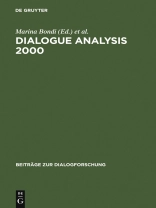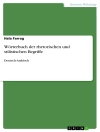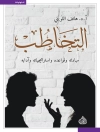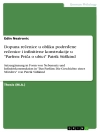Table des matières
Contents:
Part I. Bologna 2000 Round Table:
Franz Hundsnurscher , Introductory Remarks. –
Frantisek Danes , A Retrospect and a Prospect of Dialogue Studies. –
Edda Weigand , Dialogue Analysis 2000: Towards a Human Linguistics. –
Robert Maier , A Process and Structure Conception of Dialogue. –
Valerij Dem’jankov , Strategies of Understanding in Dialogue. –
Bernd Naumann , Chaotic Dialogues. Can Ideas Formulated in Complexity Theories be Applied to Dialogue Analysis? –
Karin Ajimer , Discourse Particles in Contrast. –
John Sinclair , Can We Have a Conversation with a Computer? –
Malcom Coulthard , What Did They Actually Say? A Forensic Linguist’s Evaluation of Police Evidence. –
Svetla Cmejrková , Media Dialogue as a Genre of Public Oral Discourse. –
Part II. Papers:
Carla Bazzanella /
Alberto Baracco , Misunderstanding in IRC (Internet Relay Chat). –
Massimo A. Bonfantini /
Augusto Ponzio /
Susan Petrilli , Trialogo sui dialoghi. –
Régine Borderie , Dialogues de groupe: Balzac, Zola. –
Adelino Cattani , Il disputator cortese e il disputator polemico. –
Laurentina Dascalu Jinga , Metadiscursive Triads. –
Marianne Doury , Argumentation et >mise en voix<. Les discours quotidiens sur l’immigration. –
Paula Fatur-Santos , Interacting with a Frontal Lobe Patient: What about Pragmatics? –
Gerd Fritz , Dialogical Structures in 17th Century Controversies. –
Renata Galatolo , Les stratégies de changement de
footing dans le témoignage commun au tribunal: une resource pour la construction de crédibilité. –
Julia Gillen /
Angela Goddard , Medium Management for Beginners. The Discursive Practices of Undergraduate Novice Users of Internet Relay Chat, Compared with Those of Young Children Using the Telephone. –
Luisa G. Granato /
Maria Leticia Móccero , Elicitation Utterances in Written Dialogues. –
Luca Greco , Activités de description et pratiques de cadrage dans l’interaction médicale par téléphone. –
Cornelia Ilie , Parenthetically Speaking: Parliamentary Parentheticals as Rhetorical Strategies. –
Liliana Ionescu-Ruxandoiu , Politeness Strategies in Oral Dialogues. –
Ludmila Kastler , Accords et désaccords: une dialectique communicative. –
Jiri Kraus , Argumentation in Czech Political Debates. –
Gerda Lauerbach , Opting Out of the Media-Politics Contract. Discourse Practices in Confrontational Television Interviews. –
Margareta Manu-Magda , Ein Sonderfall des sozialen Dialogs: der interethnische Dialog. –
Mirka Maraldi /
Anna Orlandini , Exclamatives, interrogatives-exclamatives et le jeu de la négation. –
Michel Marcoccia , La politesse dans les forums de discussion sur l’Internet. Règles externes, manifestations discursives et commentaires métacommunicatifs. –
Liana Pop , Actes vs. opérations. Vers de nouveaux outils dans l’analyse du dialogue. –
Anna Salazar Orvig , Eléments pour une analyse de la connivence dans le dialogue. –
Donna Shalev , Yes (and No) in Ancient Literary Greek. –
Milena Srpová , Dialogue entre cultures différentes: le rôle de l’ethos collectif. –
Grazielle Tonfoni , Information Transport through Dialogue. A System for Reducing Fuzziness due to Culture and Context Shifts. –
Elda Weizman , News Interviews on Israeli Television: Normative Expectations and Discourse Norms. –
Larissa Wunderlich , Treaties: A Comparative Analysis of a Complex Dialogic Action Game.












